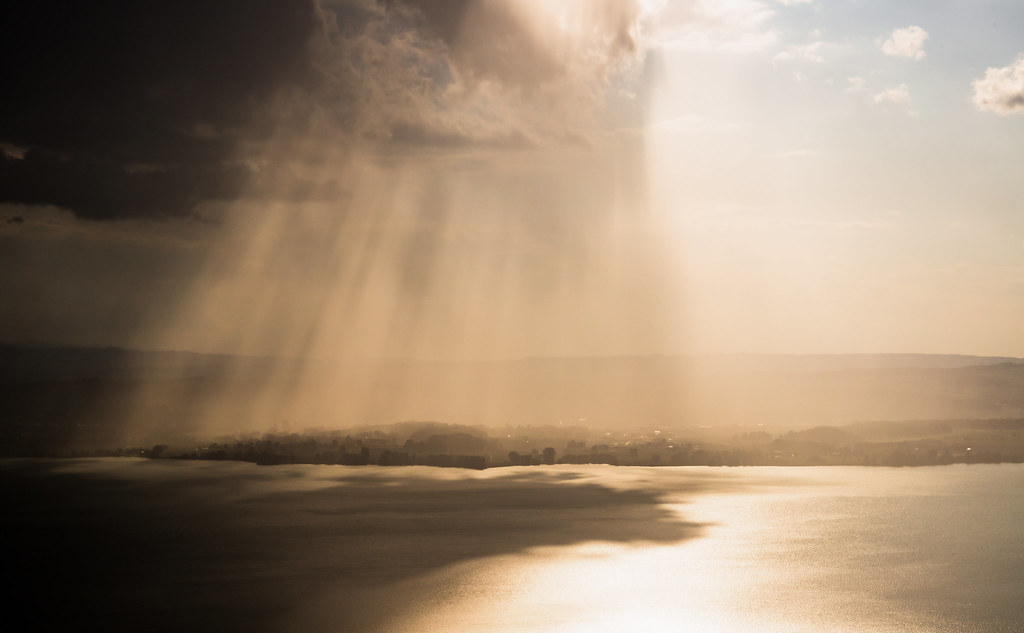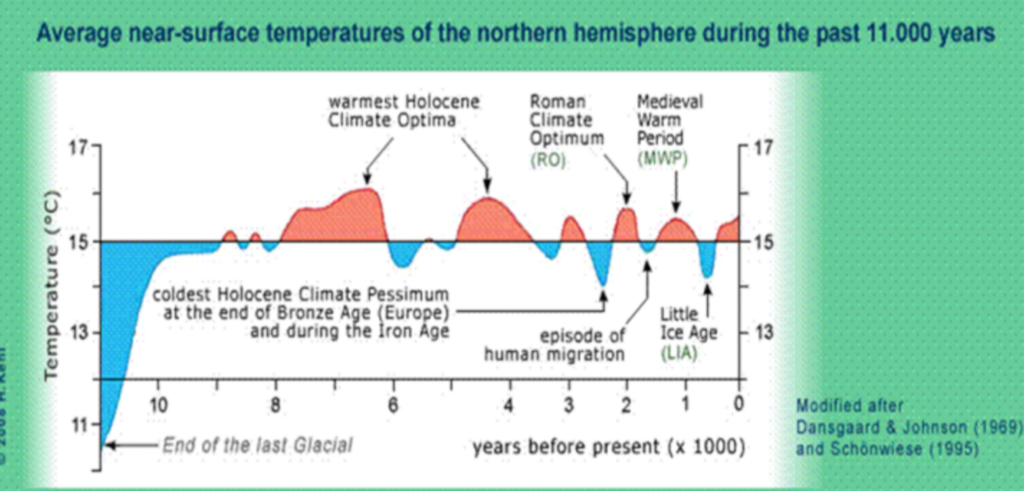by James Dent

Climate change is now a fixed part of our national psyche, as is Covid, and perhaps not surprisingly, a lot of features are shared. Perhaps the main connection is that both topics are very dependent on computer models for their illustration and projection, and are widely open to media exaggeration.
I would suggest two things are important. One is that we realise that for the last 12,000 years, our climate has been changing gradually after the last glacial advance. Secondly, that during this period there have been distinct warm and cold periods that have persisted for several decades or even centuries. The most prominent of these periods have been warm conditions at the start of the Roman occupation of Britain, the early Medieval period and the last 150 years: distinctly cold periods occurred from AD 350 to 850, the ‘Little Ice Age’ lasting from about 1500 to 1700 and then most of the 19th century. Even within these periods, there were groups of years where warmer or cooler conditions prevailed.

Similar fluctuations also occur in relation to wet and dry periods. For most of the time, the main anthropomorphic causes postulated for climate change i.e., industrial development and increasing carbon dioxide emissions, did not occur.
We perhaps should ask what defines climate change, as opposed to climate (or perhaps even weather) variability. I avidly read the weather forecast from a reputable independent weather services company, published daily in our regional local newspaper. Among the information included is a summary of the previous day’s extremes of maximum temperature, minimum temperature, highest rainfall and longest sunshine duration. There is a surprising regularity of recurrence of the same places; for example, Capel Curig for rainfall, Katesbridge and Altnahara for lowest temperature. The same weather service also issues a daily podcast weather forecast covering East Anglia; this regularly highlights the different weather in coastal areas, with emphasis on temperature and wind, which can be quite significant.
At what point do these differences become significant enough to be defined as a micro-climate? A strict numerical definition of micro-climate does not exist as far as I know. The same problem exists in quantitatively defining climate change, and relates to many matters other than simply climatological measurements. Growing seasons, crop yields and changes in aspects of the hydrological cycle certainly have to be taken into account.
Thus I tend to heave a tired sigh when some earnest person claims that they are ‘measuring climate change’. I was particularly exasperated with an interviewee on the radio who was enthusing about her research into remote sensing of upper winds. It is very worthwhile to obtain better understanding of three-dimensional wind patterns, but not solely ‘to measure climate change’, as the interviewee claimed.
Like the predictions of the progress of Covid, we need to ask what the limitations are to modelling. Too easily the model output is given the status of truth, and quickly becomes unchallengeable. Climate change predictions have been commonplace for at least 25 years, but I recently read an agricultural journalist state that in the future, farmers will have to cope with hotter, drier summers, and warmer, wetter winters, and there will be more extreme events. The message has remained the same, so have we not yet reached the predicted future? It becomes easy to summarise complicated ideas into sound bites.
Over the last 15 years, I have resigned from two national institutions which have incorporated climate change hypotheses into rigid policy statements. This situation could so easily escalate to the dystopian future depicted in the recently published novel The Denial by Ross Clark. Like all the ramifications and issues relating to Covid, the danger comes when theoretical projections provide the basis of legislation, or define the stance of particular organisations, while the media presentations rely on throw-away lines and virtue-signalling in reporting.
I can see similar dangers arising from so-called ‘environmental’ policies, such as ceasing river dredging and weed clearance, ‘rewilding’ and abandoning land and road drainage maintenance. Ultimately we could find ourselves regressing to medieval conditions, where roads and marshy areas become impassable in the winter months.
Although I have been around a long time, I am not convinced that I am now living in a different climate from that of my early years. Before I was 16, I lived through various extremes. I was born during the middle of the cold, snowy winter of 1947. The summers of 1958 and 1959 were at opposite end of the spectrum: the first was dismal, cold and wet, but the next summer was hot, dry and sunny, and extended far into autumn. We had to play touch rugby until the October half term because the ground was so hard. The winter of 1962-63 in Suffolk saw nine weeks where daily temperatures remained less than 0°C. I don’t think that the last 20 years has seen significantly different extremes. Despite several alarms, no major droughts have occurred to match the four major dry periods of the 20th century. Acceptance or otherwise of climate change theory should be dependent on the professional judgement of the individual. Hydrological science should be able to accept that.
James Dent is a retired hydrologist and meteorologist and a former World Meteorology Organisation Chief Technical Advisor to the Flood Forecasting and Warning Centre in Bangladesh. This article was initially published in the British Hydrological Society (BHS) journal Circulation, but was quickly withdrawn. Daily Sceptic Environment Editor Chris Morrison comments on stance of the BHS here.









Donate
We depend on your donations to keep this site going. Please give what you can.
Donate TodayComment on this Article
You’ll need to set up an account to comment if you don’t already have one. We ask for a minimum donation of £5 if you'd like to make a comment or post in our Forums.
Sign UpImperial College London Bans Parents From Graduation Ceremonies ‘Just in Case’
Next PostThe Climate Change Paper Cancelled by The British Hydrological Society